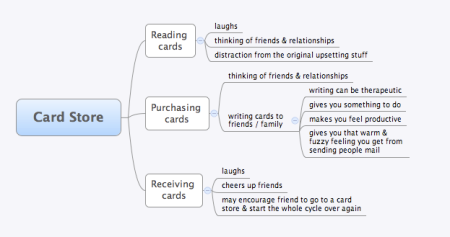I’ve been in all different levels of treatment with numerous professionals and various treatment centers, and overall I’d have to say that both group and individual therapy are important (and beneficial) in recovery. With group, there are several people who you can bounce ideas off of, get advice from, relate to, and rely on for support. I feel like most of the real therapy work happens in individual, though, where you can focus on your specific issues, goals, etc. I really do think it helps to have both individual and group components to your treatment plan, though.
This said… something that has always thrown me off is having my individual therapist as my group therapist. This has happened to me a couple of times, in residential, IOP, outpatient, etc. It changes the dynamic for me for a couple of reasons:
- Every time I said something to the group I though, “has she heard this already? did I tell her this before?”
- I read (too much) into the things that she said
- If I were having a bad day, she usually noticed
- I wondered if there would be repercussions to the things I said (for example, I didn’t want to mention something in passing and have to spend the next two individual sessions processing it).
- I worried that I’d treat group like an individual session and spend too much of the total time focusing on my own issues
These aren’t all bad things. It’s good that my therapist would recognize that I was having a crappy day, since I likely wouldn’t have brought it up and the therapists who didn’t know me as well probably didn’t know anything was not right. She also probably pushed me a little harder, since we did have a relationship and she could do that comfortably. So, for the most part, it was good for me to have some groups with my individual therapists.
With all of this said, where things start to get a little messier is when other people in the group also share the same individual therapist. I’ve been in some programs where everyone had the same primary therapist and others where there were a handful of individual therapists that also ran groups. Both situations add that extra variable to the equation – sharing a therapist with another person in your group.
The therapeutic relationship is so unique that sometimes I think it can be challenging to “share” your therapist with someone else that you know. I’m not concerned about the confidentiality as much as the dynamics of the relationship. As the patient, you only have one therapist. When you have a good relationship, it feels special. You feel like you have this connection that maybe other patients don’t have. It makes sense – every week you are confiding in this person, trusting him/her to guide you and to give you some insight. This relationship and person mean something to you. He/she is a part of your life.
Being in a group with your therapist and another one of her patients is a reminder that you’re not the only patient. You know this logically, but the reminder can be kinda tough. Sometimes it’s rough to see her concerned and focusing on someone else. It can feel invalidating. It can feel like a competition between you and the other patient. It can be hurtful if you feel like you’re being ignored or that your interaction with the therapist is different. It really adds a dozen additional variables into the therapeutic relationship equation.
There are a lot of things that make eating disorder groups tough. Girls get competitive over eating, weight, exercise, etc – even if you don’t allow talk about numbers. You have to be careful who you put in a group together, and even having one or two pretty anti-recovery people can change the whole atmosphere. Sharing a therapist with several of the girls almost adds another thing to compete over. Even if you refuse to participate in the competition to get the most attention or require the most concern (really, these competitions exist!), it can be hurtful to to feel neglected or uncared about. I don’t think this is a topic that is often addressed in groups… but I think that sharing a therapist with other girls, and all being in the same group together led by your primary therapist, can be a little tricky…


